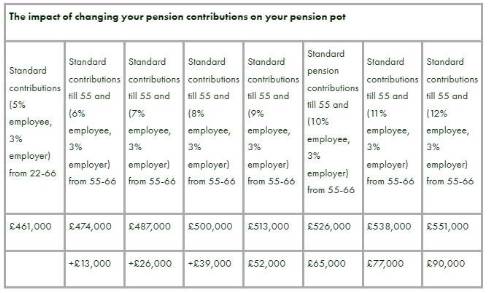Sharp interest rate rises over the last year have led to many homeowners seeking longer mortgage terms in an attempt to boost monthly budgets, however new analysis from Standard Life, part of Phoenix Group highlights the potential retirement benefit of paying your mortgage off as early as your circumstances allow. Not only will paying off your mortgage a few years clear of retirement mean you won’t need to factor housing costs into your retirement planning, but money that used to go towards your mortgage could instead be used to increase your pension contributions and boost your retirement pot.
Furthermore, increasing your pension saving towards the end of your career has the potential to significantly boost the value of your eventual pot, as your salary is likely to be higher and you have the biggest chance of benefiting from any potential compound investment growth.
Standard Life’s analysis finds that those who begin working on a salary of £25,000 per year and pay the standard monthly auto-enrolment contributions (5% employee, 3% employer) from the age of 22, could build up a total retirement fund of £461,000 by the age of 66, not taking inflation into account. However, topping up contributions by 4% for ten years from the age of 55, the age at which a 25-year mortgage term taken out at the age of the 30 would be paid off, could result in a total pot of £513,000 – £52,000 more than if no tops up were made.
Adjusting the monthly contribution further will have a greater impact on the eventual retirement pot, and generally increasing contributions by 1% from aged 55 until retirement at age 66 could lead to £13,000 extra in your pension pot:

*if beginning working with a salary of £25,000 per year and paying monthly contributions into a workplace pension at the age of 22, assuming 3.5% salary growth per year, 5% a year investment growth and a 0.75% annual charge.
The power of compound investment growth
To illustrate the potential of late-career compound investment growth, someone saving into a pension from aged 22 at standard monthly rates (5% employee and 3% employer), could have a pot of £228,000 by the age of 55.
Continuing contributions at standard rates for an additional decade (aged 55-66) could add an additional £233,000 to your pension pot bringing it to £461,000. Therefore, if your circumstances allow, increasing contributions at this stage of life could give you a big chance of boosting your pot even further.
Dean Butler, Managing Director for Retail Direct at Standard Life said: “Interest rates have rocketed since the middle of last year and so it’s understandable that people are looking for longer mortgage terms to ease the monthly strain. It won’t be possible, or even sensible, for everyone to stick to a shorter mortgage term, however it’s worth considering the potential retirement impact of any decision. There are obvious benefits to being mortgage free in retirement itself, but additionally having the option to swap mortgage payments for pension contributions in those valuable years leading up to retirement can have a significantly positive impact on your pot, and as a result on your standard of living in retirement.”
“Having a think about what you’d like when you do retire is an important first step to inform your financial planning, and helps to visualise decisions like these. The Retirement Living Standards tool from the Pensions and Lifetime Savings Association can help, which shows what life in retirement looks like at three different levels - Minimum, Moderate and Comfortable. As well as everyday costs, the tool factors in what’s needed for extras- gifts, holidays and large purchases etc., as well as the one-off expenses that come up through life.”
|

